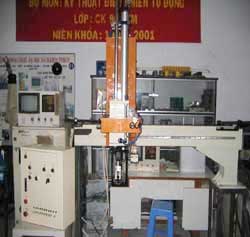In a small room at the Experimental Workshop of the Mechanical Engineering Faculty at Ho Chi Minh City University of Technology, Associate Professor Dr. Le Hoai Quoc is working with his colleagues to design and manufacture robots tailored to the needs of businesses. This is part of a robotics development program initiated by the Department of Science and Technology of Ho Chi Minh City.
 |
Here, Associate Professor Dr. Le Hoai Quoc and his team are designing and manufacturing robots according to orders from various companies. These include robots such as automatic injection molding manipulators (used in the plastics industry) and automatic welding robots (used in various manufacturing sectors, including shipbuilding).
Dr. Le Hoai Quoc stated that by the end of December 2005, two robotic arms for plastic handling were delivered to Tan Ky Nguyen Company for sale to Canon. Currently, several companies, including VINASHIN and the IMI Precision Engineering Center, have placed orders for four additional robots, and negotiations are ongoing.
This initiative is part of the robotics development program launched by the Department of Science and Technology of Ho Chi Minh City. The program involves various scientific research institutions and businesses and has been implemented since early 2005. The program’s goal is to design and manufacture robots for transfer to companies in the manufacturing sectors of Ho Chi Minh City and southern provinces.
According to the industrial robot development project of the Department of Science and Technology of Ho Chi Minh City, the demand for equipping robots in manufacturing enterprises is currently very high.
In the construction materials industry, there are approximately 500 production lines across the country based on outdated technology, with several manual processes such as feeding coal into furnaces. Workers in this stage are frequently exposed to hazardous environments, often retiring after about 15 years, with few living more than 10 years post-retirement.
In the mechanical engineering and metallurgy sectors, the metal casting process (including metal pouring and mold removal) has a high demand for robot usage due to the strenuous working environment, which poses risks of burns and dust exposure.
In the plastics industry, many companies must import plastic handling robotic arms (a type of robot) at prices reaching hundreds of thousands of USD.
 |
| Vertical PET plastic preform manipulator. (Photo: Dr. Hoai Quoc) |
In light of this situation, the Department of Science and Technology of Ho Chi Minh City conducted a survey on the demand for robots among domestic businesses. The survey revealed that many entities, such as the Viglacera Glass and Ceramic Corporation, VIFG Float Glass Company (Tan Dong Hiep Industrial Zone, Di An, Binh Duong), SAMCO Company, Nha Be Shipbuilding Company, and Do Thanh Plastics Company, all have needs for robots. These robots include those for loading and unloading products, welding pressure vessel shells, automotive repairs, and ship welding. Notably, the Mobile Brigade 113 expressed interest in a type of remotely controlled mobile robot for security and inspection purposes in suspect locations.
The Ho Chi Minh City Robotics Program Emerges from Actual Needs
The program is led by the Department of Science and Technology of Ho Chi Minh City in collaboration with the Science and Technology Board (Vietnam National University, Ho Chi Minh City); the National Key Laboratory of Numerical Control and Systems Engineering at Ho Chi Minh City University of Technology; the NEPTECH New Technology Deployment Center; and the Regional Quality Control and Measurement Center II, General Department of Defense Technology.
According to Associate Professor Dr. Phan Minh Tan, Deputy Director of the Department of Science and Technology of Ho Chi Minh City, domestically manufactured robots will be 20-30% cheaper than imported ones.
In practice, immediately after the program was launched, a company specializing in production equipment, Tan Ky Nguyen Company (17 Phan Phu Tien, District 5, Ho Chi Minh City), ordered seven robotic arms for plastic handling for injection molding machines, with a total value of over $56,000.
Currently, Dr. Le Hoai Quoc believes that to meet the demand from businesses, it is essential to establish a formal workshop. Previously, research, design, and manufacturing of robots were conducted at the National Key Laboratory of Numerical Control and Systems Engineering at Ho Chi Minh City University of Technology.
Dr. Le Hoai Quoc stated that if a formal workshop were established, robot prices could decrease further due to mass production, allowing bodies to be cast rather than welded individually as they are now. The machine bodies, cast from aluminum alloys, would not only reduce costs but also make the machines lighter and easier to transport.
|
According to statistics from the United Nations Economic Commission for Europe (UNECE) affiliated with the International Federation of Robotics, there are currently about 770,000 robots being utilized in industrial manufacturing worldwide. Among these, 350,000 (45.5%) are in Japan, 233,000 (30.3%) in the EU, and about 14,000 (13.5%) in North America. In Europe, Germany leads with 105,000 robots, followed by Italy (47,000), France (24,000), Spain (18,000), and the United Kingdom (14,000). During the most recent economic downturn (1997 – 2002), the robot market declined by an average of 12 – 16% per year. However, overall, the decrease in investment compared to other high-tech products remains significantly more favorable. Global orders for industrial robots from most of the world’s largest manufacturers saw a 26% increase in 2003 compared to the same period in 2002. The trend forecast for the period from 2003-2006 predicts sales growth for robot products: North America is expected to increase by 35%, Europe by 25%, Asia by 18%, and other regions by 18%. |


















































